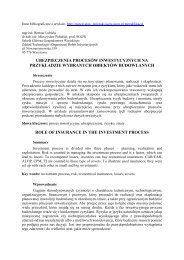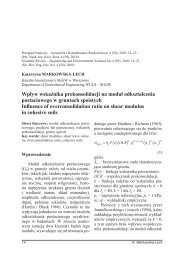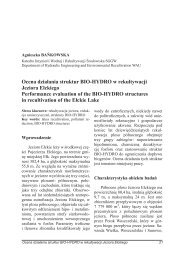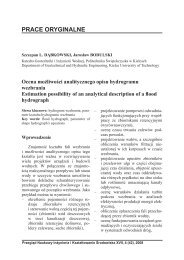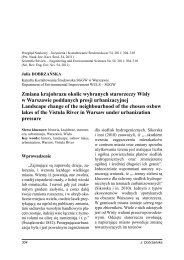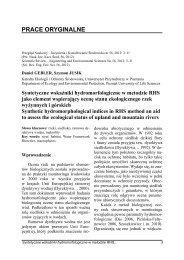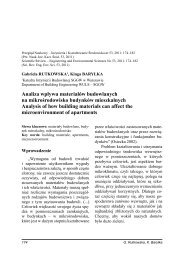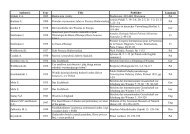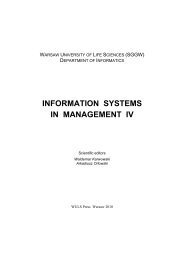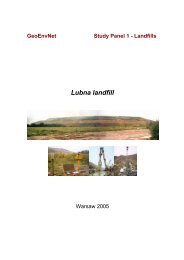42 S. Kalinowskilower education are willing to run their own business (and only 11% people with elementaryeducation). The main reason for resignation of self-employment is lack of adequatefunds for launching a business (47.1%), lack of the sense of the point of running own business(36.2%), lack of idea (19.6%) and lack of skills and qualifications (11.9%).One of the conditions of a proper educational pattern is starting it in the early phase ofchild’s development, i.e. between the ages of three and five. In rural areas of the WielkopolskieVoivodship, as well as in Poland, pre-school education is of poor quality and itonly covers children from the age of six. Only one in ten children in rural areas attendsa kindergarten at an earlier age (every third child does in urban areas), which greatly impedesmaking the opportunities for development equal and contributes to the fossilisationof discrepancies between urban and rural areas. As education is important regarding both,the capital dimension, implemented on the market and, at the same, the personal development,not related with economic opportunities, activities of local governments aimed atincreasing the accessibility of education, starting with the kindergarten level, are inevitable.Later on, it is necessary to adjust educating the labour force and adapting it to locallabour markets. According to Wieczorek [2001], it should not be forgotten that schoolsshould serve the purpose of increasing households’ competitiveness. Hence, graduatesshould be well equipped with skills inevitable in the market economy, allowing them tocompete at the local market.CONCLUSIONSEducation constitutes a significant element of forming the value of human capital.Although the latter cannot be acquired, but only, to some degree, accumulated as a resultof increased education, state activities and the activities of NGOs, aiming at increasingthe quality of human capital are inevitable. They may result in an increase of the rate ofeconomic growth and, particularly, an improvement in the social and economic situation ofhouseholds. It is particularly important due to the relatively low level of education amongrural population, as only 4.2% have academic education. As rural youth want, to a largedegree, to continue their education, the main obstacle is constituted the lack of sufficientmoney supplies. The institutions responsible for the improvement in the quality of humancapital need to support continual training. Due to the state budget limitations, there isa need for activities and instruments of state policy to encourage investors and otherpeople to invest in human capital. Without proper solutions and instruments, increasingthe competitiveness of rural households in the market will not be possible.REFERENCESGUS, 2003. Gospodarstwa domowe i rodziny. Województwo wielkopolskie. Poznań.Hauser J., 1999. Komunikacja i partycypacja społeczna. Poradnik. Wyd. Małopolskiej Szkoły AdministracjiPublicznej Akademii Ekonomicznej, Kraków, 41.Juroszek L., 2008. Partycypacja lokalna w gminie Istebna i możliwości jej wykorzystania wzrównoważonym rozwoju gminy, [in:] Podedworna H., Ruszkowski P. (edit.) Społeczneaspekty zrównoważonego rozwoju wsi w Polsce. Partycypacja lokalna i kapitał społeczny,Scholar, Warszawa, 55.Acta Sci. Pol.
Education as an element of competitiveness of rural households in the Wielkopolskie... 43Kalinowski S., Łuczka-Bakuła W., 2007. Ubóstwo ludności wiejskiej województwa wielkopolskiego.Wydawnictwo Akademii Rolniczej w Poznaniu, Poznań, 152.Marciniak S., 2002. Kapitał ludzki a innowacyjność gospodarki, [in:] Marciniak S. (edit.) Ekonomiczneaspekty globalizacji, Zeszyty Naukowe Kolegium Nauk Społecznych i AdministracjiPolitechniki Warszawskiej, zeszyt 20, Warszawa, 14.Michalski B., 2006. Kapitał intelektualny a międzynarodowa konkurencyjność gospodarki, [in.]Dudek M. (edit.) Integracja i europejski rynek pracy. Wydawnictwo UZ Zielona Górai WSM Legnica, 123.Nelson R.R., Phelps E.S., 1966. The sources of economic growth. Harvard University Press, London.Orczyk J., 2005. Polityka społeczna. Uwarunkowania i cele. Wydawnictwo Akademii Ekonomicznejw Poznaniu, Poznań, 185–186.Wieczorek T., 2001. Kształcenie na potrzeby wielofunkcyjnego rozwoju obszarów wiejskich, [in:]Ziejewski T. (edit.) Strategia inwestowania i rozwoju przedsiębiorstw oraz kształceniakadr w gospodarce żywnościowej XXI w., Szczecin, 421.Zajączkowska-Jakimiak S., 2006. Wiedza techniczna i kapitał ludzki w teorii wzrostu gospodarczego.Gospodarka Narodowa, nr 11–12, 60.EDUKACJA JAKO ELEMENT KSZTAŁTOWANIA KONKURENCYJNOŚCIWIEJSKICH GOSPODARSTW DOMOWYCH W WOJEWÓDZTWIEWIELKOPOLSKIMStreszczenie. Kapitał ludzki w dobie globalizacji i integracji gospodarczej jest corazważniejszym elementem konkurencyjności gospodarstw domowych. Jego głównądeterminantą jest wykształcenie, które sprzyja zwiększonej aktywizacji ludności. Osobylepiej wykształcone lepiej odnajdują się na rynku i łatwiej dostosowują do zmieniającychsię warunków rynkowych. W związku z tym konieczne są komplementarne i aktywnedziałania instytucji zajmujących się kształceniem, rozwiązujące i promujące różne formyuzupełniania kwalifikacji zawodowych, a także kształcenia ustawicznego. Absolwenci szkółpowinni być wyposażeni w umiejętności niezbędne w gospodarce rynkowej, podnosząceich konkurencyjność.Słowa kluczowe: wykształcenie, ludność wiejska, kapitał ludzkiAccepted for print – Zaakceptowano do druku 02.02.2011Oeconomia 10 (1) 2011
- Page 6 and 7: 6 A. Gawrońska, S. Paszkowskicultu
- Page 8 and 9: 8 A. Gawrońska, S. Paszkowskinumbe
- Page 10 and 11: 10 A. Gawrońska, S. PaszkowskiTabl
- Page 12: 12 A. Gawrońska, S. PaszkowskiTabl
- Page 15 and 16: The distribution of social security
- Page 17 and 18: %180,0160,0140,0120,0100,080,060,04
- Page 19: The distribution of social security
- Page 22 and 23: 22 R. Hryniewski, W. Mądry, D. Goz
- Page 24 and 25: 24 R. Hryniewski, W. Mądry, D. Goz
- Page 26 and 27: 26 R. Hryniewski, W. Mądry, D. Goz
- Page 28 and 29: 28 R. Hryniewski, W. Mądry, D. Goz
- Page 30 and 31: 30 R. Hryniewski, W. Mądry, D. Goz
- Page 32 and 33: 32 R. Hryniewski, W. Mądry, D. Goz
- Page 35 and 36: Oeconomia 10 (1) 2011, 35-43EDUCATI
- Page 37 and 38: Education as an element of competit
- Page 39 and 40: Education as an element of competit
- Page 41: Education as an element of competit
- Page 46 and 47: 46 E. Majewski, P. Sulewski, M. Rag
- Page 48 and 49: 48 E. Majewski, P. Sulewski, M. Rag
- Page 50 and 51: 50 E. Majewski, P. Sulewski, M. Rag
- Page 52 and 53: 52 E. Majewski, P. Sulewski, M. Rag
- Page 54 and 55: 54 E. Majewski, P. Sulewski, M. Rag
- Page 56 and 57: 56 E. Majewski, P. Sulewski, M. Rag
- Page 58 and 59: 58 L. Mazal, K.J. RowlesIn the West
- Page 60 and 61: 60 L. Mazal, K.J. RowlesThe most im
- Page 62 and 63: 62 L. Mazal, K.J. RowlesGDPt= GDP0+
- Page 64 and 65: 64 L. Mazal, K.J. RowlesTHE TIME SE
- Page 66 and 67: 66 L. Mazal, K.J. RowlesTable 4. Ac
- Page 68 and 69: 68 L. Mazal, K.J. RowlesNelson Ch.R
- Page 70 and 71: 70 A. Ptak-Chmielewskastatistics, w
- Page 72 and 73: 72 A. Ptak-Chmielewska3025birth rat
- Page 74 and 75: 74 A. Ptak-ChmielewskaSECTOR OF ACT
- Page 76 and 77: 76 A. Ptak-Chmielewskabirth rate fo
- Page 78 and 79: 78 A. Ptak-Chmielewskawere trade fi
- Page 80 and 81: 80 A. Ptak-ChmielewskaREFERENCESBal
- Page 83 and 84: Oeconomia 10 (1) 2011, 83-95THE EFF
- Page 85 and 86: The effi ciency of selected real es
- Page 87 and 88: The effi ciency of selected real es
- Page 89 and 90: Table 1. Efficiency of real estate
- Page 91 and 92: The effi ciency of selected real es
- Page 93 and 94:
The effi ciency of selected real es
- Page 95:
The effi ciency of selected real es
- Page 98 and 99:
98 J. Sosnowski, G.A. CiepielaJalin
- Page 100 and 101:
100 J. Sosnowski, G.A. Ciepiela2007
- Page 102 and 103:
102 J. Sosnowski, G.A. CiepielaTabl
- Page 104 and 105:
104 J. Sosnowski, G.A. CiepielaTabl
- Page 106 and 107:
106 J. Sosnowski, G.A. Ciepiela1400
- Page 108 and 109:
108 J. Sosnowski, G.A. CiepielaOsek
- Page 110 and 111:
110 E. SzymańskaProducts by Activi
- Page 112 and 113:
112 E. Szymańskatroduced TFI which
- Page 114 and 115:
114 E. Szymańskabers of companies
- Page 116 and 117:
116 E. SzymańskaTable 3. Tourism v
- Page 118 and 119:
118 E. SzymańskaREFERENCESCoccossi
- Page 120 and 121:
120 J. WiśniewskaEvery society can
- Page 122 and 123:
122 J. WiśniewskaStatistical analy
- Page 124 and 125:
124 J. WiśniewskaCommon Agricultur
- Page 126 and 127:
126 J. WiśniewskaTable 3. An attem
- Page 128 and 129:
128 J. Wiśniewskathe application o
- Page 130 and 131:
130 J. Wiśniewskainstitutional cos
- Page 132 and 133:
132 J. Wiśniewskaemployed in agric
- Page 134 and 135:
134 J. WiśniewskaLong term viabili
- Page 136 and 137:
136 J. Wiśniewska--The level of re
- Page 139 and 140:
Oeconomia 10 (1) 2011, 139-148INNOV
- Page 141 and 142:
Innovativeness of food production e
- Page 143 and 144:
Innovativeness of food production e
- Page 145 and 146:
Innovativeness of food production e
- Page 147 and 148:
Innovativeness of food production e
- Page 149 and 150:
Oeconomia 10 (1) 2011, 149-158LOCAL
- Page 151 and 152:
Local governance activities in supp
- Page 153 and 154:
Local governance activities in supp
- Page 155 and 156:
Local governance activities in supp
- Page 157 and 158:
Local governance activities in supp
- Page 159 and 160:
Oeconomia 10 (1) 2011, 159-169CHANG
- Page 161 and 162:
Changes in rural women’s movement
- Page 163 and 164:
Changes in rural women’s movement
- Page 165 and 166:
Changes in rural women’s movement
- Page 167 and 168:
Changes in rural women’s movement
- Page 169:
Changes in rural women’s movement
- Page 172:
Ewa SzymańskaTourism function of M




